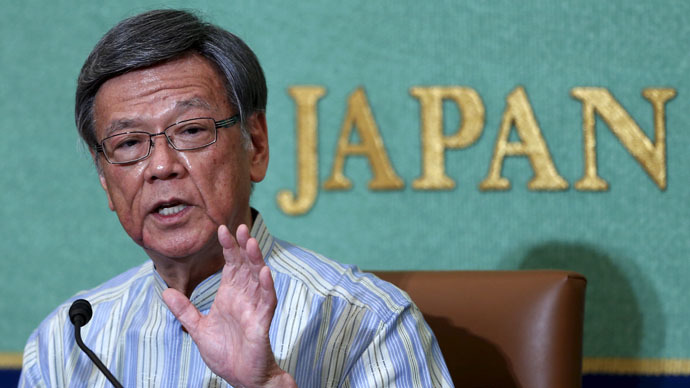US insists military bases will stay in Okinawa, despite opposition from locals, governor
US officials have told Okinawa’s governor that American troops will remain on the Japanese island despite mass protest rallies. The governor, in his turn, had pledged to continue his anti-base campaign.
“The United States’ troop presence in Okinawa is fundamental to our treaty commitment to the defense of Japan,”said a statement from US State Department, following the meeting of US officials with Okinawa Governor Takeshi Onaga on Wednesday.

During the meeting, US officials “underscored that the governments of the United States and Japan share an unwavering commitment to the construction of the Futenma Replacement Facility (FRF), the airfield at Camp Schwab.”
Camp Schwab is a US Marine Corps camp in the city of Nago, northwestern Okinawa. Local residents have staged several protests in May in front of the base, demanding that US marines leave their island.
READ MORE: Marines go home! Scuffles between protesters, police near US base on Okinawa
“The US officials reiterated that the plan to construct the FRF is the only solution that addresses operational, political, financial, and strategic concerns and avoids the continued use of Marine Corps Air Station (MCAS) Futenma.”
Posted by 3D Reconnaissance Battalion on mercredi 27 mai 2015
Onaga later told reporters that he still expressed his opposition to the plan of US officials to continues with the base.
"I warned the officials that the construction of a [replacement] base will not be implemented smoothly if things keep going as they currently are," Onaga said.
He was referring to a decision by the Japanese government in Tokyo to move ahead with preparatory work for a facility in Nago city despite opposition from the locals.
Posted by Akaki Rereki on vendredi 29 mai 2015
On Monday, Nago's mayor, Susumu Inamine, said that Japan was treating Okinawa as a “colony,” showing the photos of demonstrators clashing with police in front of US base.
“Having the locals at each other's throats and divided among themselves is a strategy typical of colonial policies,” he added.
Tim Beal, a New Zealand-based researcher and author of “North Korea: The Struggle Against American Power,” questions the true purpose of US actions in Japan.
“The US says it wants to defend Japan, but it’s not the real story,” he told RT. “It’s really not plausible to suggest any country wants to attack Japan. The US primarily is worrying about the rise of China and the military aspect. And it needs its bases in Japan.”
Posted by Akaki Rereki on vendredi 29 mai 2015
Thousands have been recently marching in Okinawa and across Japan in protest against the planned relocation of a US military base in Okinawa. The demonstrators criticized the Japanese government, who appear to be turning a deaf ear to the locals.
READ MORE: ‘Okinawa without US bases’: 1000s march against foreign military presence in Japan
The US Marine Corps’ Futenma Air Station in heavily populated Ginowan city has been a cause of tension between US servicemen and locals. Home to about 1 percent of Japan’s population, Okinawa has nearly half of the 47,000 US troops based in Japan.
Tokyo wants to shut the existing base but open a new one in Henoko, in the district of Nago, in the center of the southern Japanese island. But the majority of the local residents, as well as Onaga, want the construction of the replacement base to be scrapped.
In March, Onaga demanded the underwater survey needed to build an offshore airstrip for the new base be stopped, citing environmental damage.
READ MORE: Okinawa governor demands suspension of Osprey flights after deadly Hawaii crash
Onaga met with Japanese Defense Minister Gen. Nakatani in May for the first time to discuss the relocation plan. They failed, however, to resolve their differences.
There is a long history of incidents and crimes allegedly committed by US troops on the island. The current wave of anti-base sentiment on Okinawa was sparked by a 1995 case when three US marines were reported to have kidnapped and brutally raped a 12-year-old schoolgirl.
There were also less-publicized sex crime cases involving underage victims reported in 2001 and 2005, the fatal running over of a female high school student by a drunken US marine in 1998, and other incidents.












